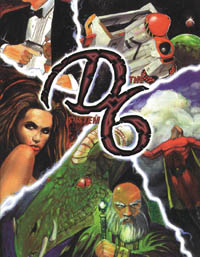Legend System

The D6 System: The Customizable Roleplaying Game
|
|
| Designer(s) | Various authors |
|---|---|
| Publisher(s) | West End Games |
| Publication date | 1996 |
| Genre(s) | Universal |
| System(s) | The D6 System |
The D6 System is a role-playing game system published by West End Games (WEG) and licensees. While the system is primarily intended for pen-and-paper role-playing games, variations of the system have also been used in live action role-playing games and miniature battle games. The system is named after the 6-sided die, which is used in every roll required by the system.
Characters in the D6 System are defined by attributes and skills. Attributes represent the raw ability of a character in a certain area. Most D6 System games utilize anywhere from six to eight attributes, though these can vary greatly in number and name by the game in question. Acumen, Intellect, Knowledge, Perception, Presence and Technical are examples of mental attributes; Agility, Coordination, Mechanical, Physique, Reflexes and Strength are examples of physical ones. Skills are the trained abilities of the character and are associated with a specific attribute (e.g., driving, acrobatics, and climbing might be skills based on the Reflexes attribute). Each attribute and the skills under it are rated in values of Dice and Pips; Dice equal the number of dice rolled and Pips equal a one or two point bonus added to the roll to determine the result. The more dice and pips in the rating the better the character is at that skill or attribute. A character with a Strength rating of 4D+2 is stronger than a character with a Strength rating of 3D+1, for example.
Character actions are resolved by making dice rolls against a difficulty number. There are two types of difficulties, standard and opposed. To perform a standard difficulty action, the gamemaster calls for the player to roll the dice for a certain attribute or skill. The value of each die is totalled and the pips are added to the die roll to get a total. This total along with any GM or system imposed modifiers is compared against a target difficulty number. To perform an opposed roll action, the two parties involved (usually the player and a gamemaster controlled character) both roll their appropriate skills dice, total them and any modifiers and compare the results. If the first party's roll is higher than that of the second, he wins the contest and the rest of the result is resolved. If the second party equals or exceeds his opponent's roll, then the second party wins the contest.
...
Wikipedia
